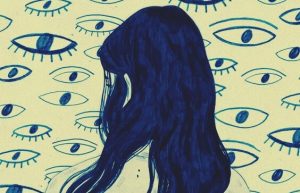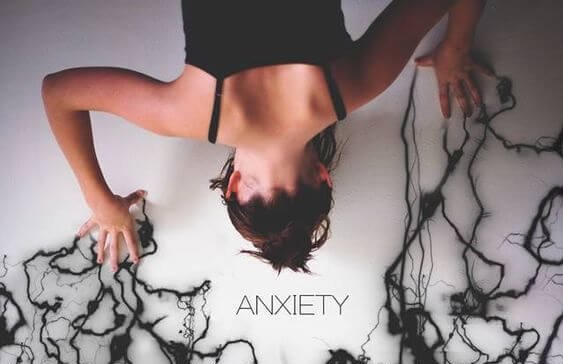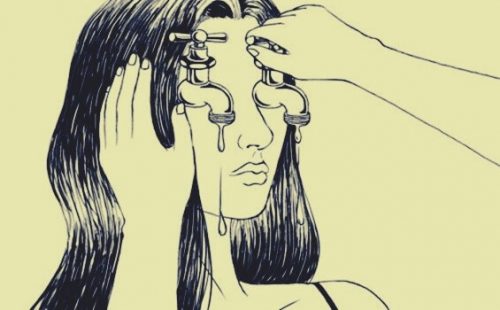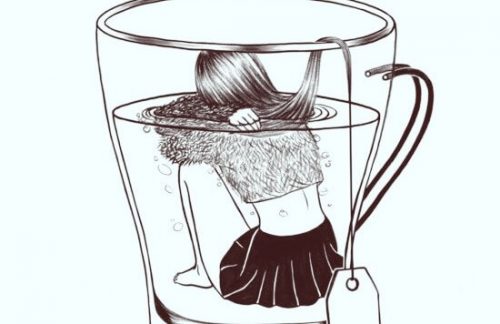Anxiety Makes Us Perceive the World Differently

It’s important to clarify that there are two types of anxiety. One of them is adaptive, and its function is to prepare us to face danger or a threatening situation. In other words, it’s an instinctive and reasonable response that protects you against a potential risk.
The other type of anxiety is psychological or pathological. It simply appears, even though there’s no real risk. Perhaps it’s more accurate to say that it arises in the face of imaginary or oversized threats, which are almost always exaggerated. In this regard, it’s as if there’s a danger, but the person can’t determine where it is or what it consists of.
People express anxiety in many ways. What these manifestations have in common is the fact that the feeling of fear or apprehension is totally exaggerated. Sometimes it leads to a constant rumination of thoughts. Other times it also ends up unleashing panic attacks or leads to isolation.
“Fear sharpens the senses while anxiety paralyzes them.”
-Kurt Goldstein-

Anxiety and cognitive bias
In pathological anxiety, there’s a skewed or altered perception of the world. This means that you only select or pay attention to bits of your reality that could explain your feeling of being under threat. In the same way, this information is interpreted incorrectly and is remembered more than other data.
Someone who, for example, feels anxious in their relationships with others, will tend to see only some aspects in others. They will also be very attentive to any gesture of rejection, however minimal. Silence could be interpreted as an indication that they’re wrong or that someone doesn’t want to talk to them. They won’t pay attention to the signs of acceptance or interest unless they are extraordinarily visible.
Someone who suffers from anxiety will see the “fateful signs” in any manifestation of nature. Hence, a very colorful sunrise could mean that “something is going to happen”. A moon that is too bright generates fear, but the person doesn’t know why.

The Four-factor Theory
Psychologist Michael Eysenck created a conceptual proposal called the “Four-Factor Theory.” It defines the main ways that someone with anxiety creates new perceptions. Each of these pathways implies a cognitive bias. The four factors are:
- Biased perception of a specific stimulus. This occurs when anxiety is directed specifically at an object or at a very precise aspect of reality. It leads to so-called “phobias”. If the anxiety involves behavior itself, it’s called “social phobia”.
- Biased perception of the body itself and its physiological reactions. This happens when the body itself is the battlefield. Its functions and responses are assumed to be signs of danger. This leads to “anguish disorder”.
- Biased perception of one’s own thinking and personal ideas. In this case, what is perceived as risks or threats occurs in one’s own mind. It leads to Obsessive Compulsive Disorder (OCD).
- Global skewed perception. This corresponds to cases in which anxiety is directed at all the factors listed: specific elements, the behavior itself, the body, and the mind. When this happens, it’s known as Generalized Anxiety Disorder (GAD).
Each of these manifestations of anxiety makes us see reality in a totally biased way. There’s a strong resistance or impossibility in them for introducing information that questions the validity of these perceptions.

Treating incorrect interpretations
All anxiety disorders can be treated, even the most severe cases. Therapy aimed at overcoming these symptoms will help the person focus their attention on other aspects of reality that they’re omitting.
It’s possible to learn to give wider meanings to what we perceive. Sometimes we just need someone to help us understand that feeling a strong beating heart doesn’t mean we’re on the verge of cardiac arrest. It’s also normal that not everyone likes us, but that doesn’t mean they intend to exclude us.
Any form of anxiety is important. In fact, when we ignore the symptoms as a coping strategy, they tend to grow and invade our personality. In this sense, seeking timely help is the best way to learn to face this condition that causes so much suffering.
This text is provided for informational purposes only and does not replace consultation with a professional. If in doubt, consult your specialist.








